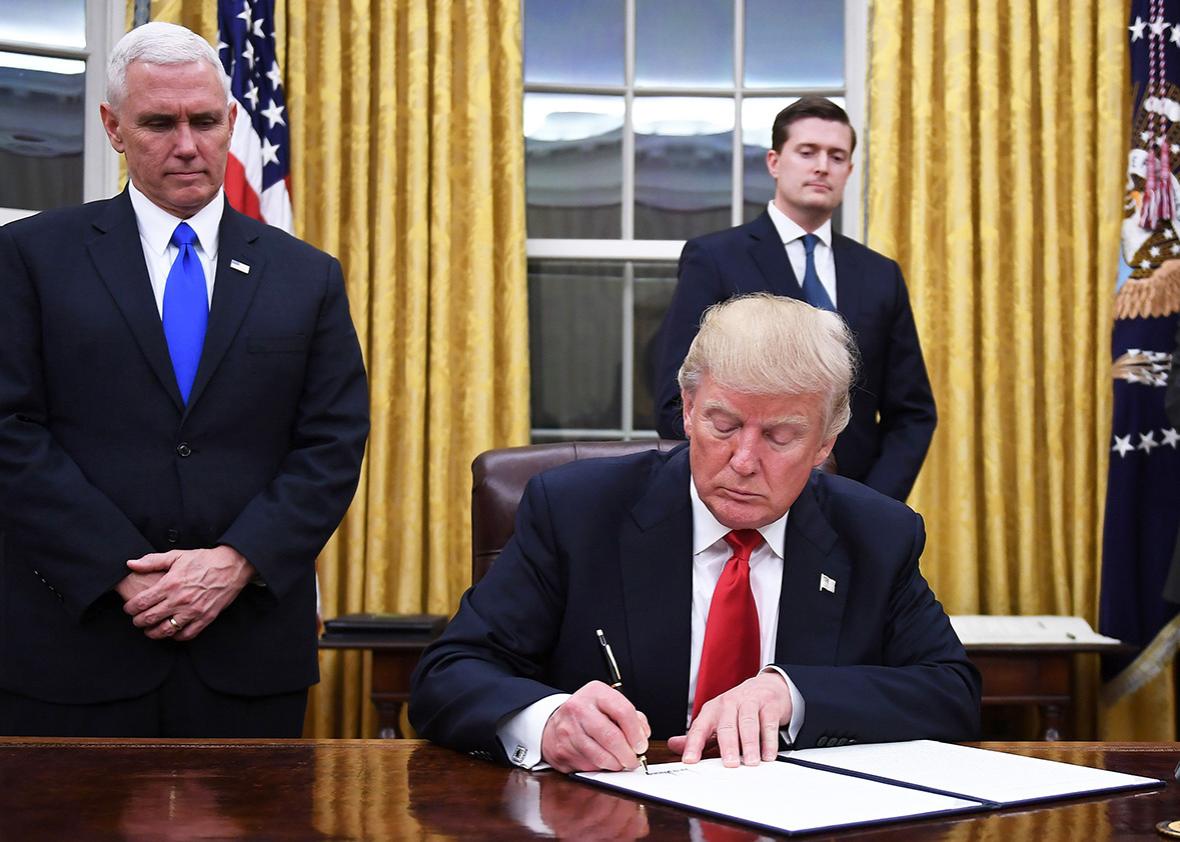President Trump on Friday issued a vaguely worded executive order instructing departments and agencies to “exercise all authority and discretion available to them to waive, defer, grant exemptions from or delay the implementation of any provision or requirement” of the Affordable Care Act that poses a serious burden on states, insurers, insurees, patients, and so on. The order clears a path for would-be Health and Human Services Secretary Tom Price, and others, to begin taking administrative action to dismantle the Affordable Care Act.
The ACA provision that immediately comes to mind when you read the text is the mandate requiring individuals to purchase health coverage or face a tax penalty. As my colleague Jordan Weissmann wrote, Trump adviser Kellyanne Conway confirmed that was a major target of the order, telling ABC News’s George Stephanopoulos that Trump may stop enforcing the individual mandate.
As Weissmann wrote, that would be a great way to blow up insurers’ risk pools and thus the health insurance markets. But if done with some discretion, it could be a way for the administration to buy some time for Republican legislators, who are beginning to freak out about “repeal and replace,” while still tangibly advancing toward repeal.
A sizable bloc of Senate Republicans has expressed concerns about the design of the leadership’s “repeal and delay” plan, and for good reason. The “repeal” part of this effort would hew closely to the 2015 “test run” repeal legislation passed by Republicans, which—among other things—eliminated the individual mandate without touching the law’s regulatory provisions. The Congressional Budget Office’s recent rescoring of that 2015 reconciliation legislation showed that millions would lose (or choose to forgo) health coverage, while premiums would spike and carriers would continue to withdraw from health insurance exchanges. Eliminating the mandate immediately while leaving regulations on the books is the recipe for health insurance market chaos, and it’s why this bloc of Senate Republicans is insisting that repeal and replace be done simultaneously (or close to it). Doing so simultaneously, on the downside, would be a much longer process that risks losing willpower for the effort altogether and deprives the new administration of an early political win.
Administrative action to weaken, though not totally defang, the individual mandate might help Republicans in both the executive and legislative branches get closer to what they each want.
Cynthia Cox, an associate director at the Kaiser Family Foundation who studies the ACA’s effect on insurers and enrollees, explains that “it seems like weakening the individual mandate through administrative action might be a way of achieving that goal” of delivering immediate results “without having as much pressure to come up with the replacement part immediately.” It would give the Trump administration a tangible policy change to tout, and it would give “Congress something to point to in debating whether or not to go ahead and repeal right away.”
The specifics of the weakening would be important. If the administration gives out exemptions like candy to all comers or—if it’s feeling legally frisky—directly instructs the Internal Revenue Service to quit enforcing the mandate, that could be too disruptive for markets. But a “scale back of the individual mandate through administrative action, where it still exists, where people still have to apply for exemptions so that there is still a process that people have to go through,” Cox says, “that that might be enough to keep insurers in the game.”
“They might still raise premiums, if they know that there’s a lot of new hardships exemptions being given out,” Cox says. “But if there is still some form of the individual mandate in place, that might be enough to keep them in the market.”
Weakening, but not eliminating, the individual mandate administratively could be the short-term bit of incremental action that hits that sweet spot of giving Trump an early “win,” buying Republicans in Congress more time, meeting a minimum threshold of acceptability for insurers, and pissing off Democrats. How it’s written, though, is a delicate matter: Left undercooked, it would provide the Trump administration with a useless symbolic gesture; allowed to overcook, it would create the same market chaos it’s trying to spare Republicans in Congress from having to make.
